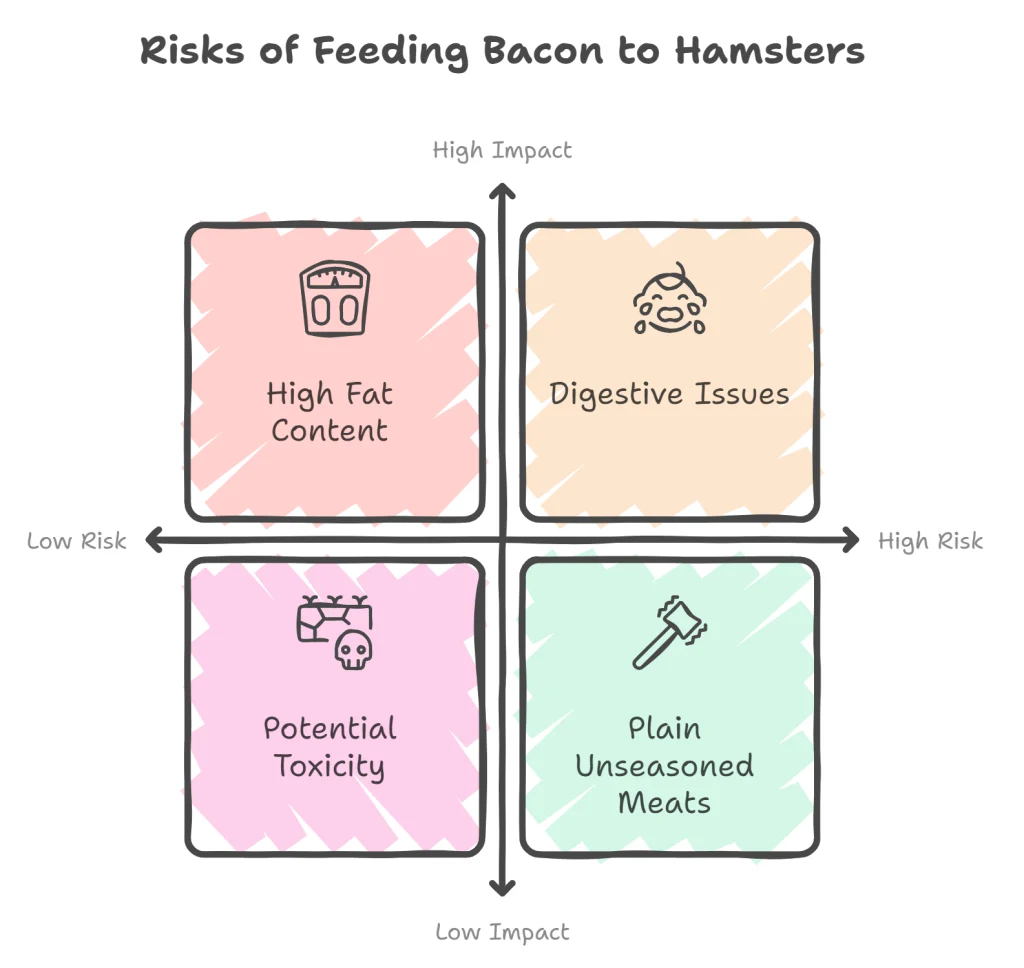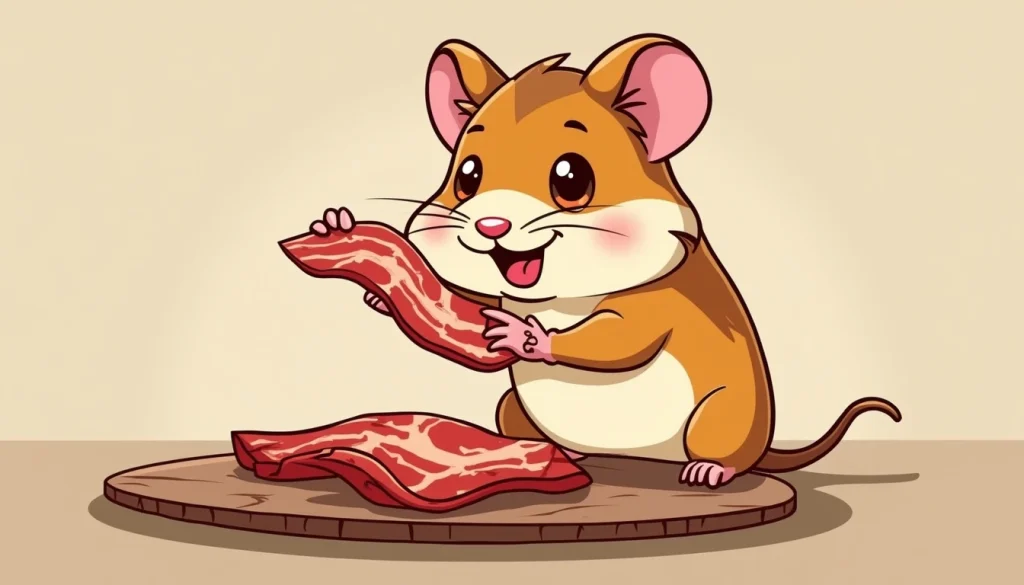1. Introduction
Feeding hamsters human food can be tricky, as not everything we eat is suitable for them. While some treats may seem harmless, many can pose health risks to these small pets. Bacon, a popular breakfast staple, is one of the foods that often raises questions. Given how nuanced hamster diets are, especially when it comes to processed human foods, it’s important to carefully consider what is safe. This blog explores whether hamsters can eat bacon and the potential consequences of doing so.
2. Can Hamsters Eat Bacon?
Short Answer: No, hamsters should not eat bacon.
Bacon is unsuitable for hamsters due to its high fat content, preservatives, and seasonings. These can lead to obesity, digestive issues, and even toxicity in hamsters. While they do need protein, bacon is far too fatty and processed to be a healthy option.
3. Reasons to Avoid Bacon

3.1 High Fat Content
Bacon is loaded with fat, making it highly unsuitable for hamsters. Their small bodies cannot process large amounts of fat efficiently, leading to serious health problems. Consuming fatty foods like bacon can cause obesity in hamsters, which in turn increases the risk of diabetes and heart disease. These conditions are life-threatening for such tiny animals, making it crucial to avoid giving them foods that are too rich in fat.
3.2 Digestive Issues
Hamsters have delicate digestive systems, and processed meats like bacon are far too complex for them to handle. Bacon is high in calories and fat, which can cause gastrointestinal distress in hamsters. Symptoms may include diarrhea, bloating, and other stomach issues that can lead to further health complications. The excess fat disrupts their natural digestion, making processed foods a harmful choice.
3.3 Potential Toxicity
Bacon is often seasoned and contains preservatives that are harmful to hamsters. Ingredients like salt, nitrates, and other chemicals used in processed meats can be toxic. Even if bacon is cooked without seasonings, the risk from these additives remains, making processed meats dangerous for hamsters. Plain, unseasoned meats are safer, but processed options like bacon should be avoided entirely to prevent potential toxicity.
4. Nutritional Needs of Hamsters
Hamsters require a well-balanced diet that provides all their essential nutrients in the right proportions. Their diet should include a mix of commercial pellets, fresh fruits and vegetables, and safe protein sources.
4.1 Pellets
Pellets should form the base of a hamster’s diet. These provide a balanced mix of vitamins, minerals, and other nutrients that hamsters need to stay healthy. A good pellet formula ensures that they get all the necessary nutrients without overloading their system with fats or sugars.
4.2 Fruits and Vegetables
While hamsters can eat fruits and vegetables, they should be given in moderation. Safe options include carrots, broccoli, cucumbers, and apples (without seeds). These foods are rich in vitamins and can serve as healthy treats. However, sugary fruits should be limited to avoid weight gain and digestive issues.
4.3 Protein Sources
Hamsters do require some protein, but healthier options than bacon are available. Cooked chicken (plain, unseasoned), mealworms, and hard-boiled eggs are excellent protein sources that provide the nutrients hamsters need without the harmful fats and additives found in processed meats. These options align much better with a hamster’s dietary needs.
5. Safe Alternatives to Bacon

5.1 Cooked Chicken
Unseasoned, cooked chicken is a much healthier protein source for hamsters than bacon. It is lean, free from harmful preservatives, and gentle on a hamster’s digestive system. Unlike bacon, chicken doesn’t contain high levels of fat or sodium, making it a safe option to include in a hamster’s diet in small portions. Plain chicken provides the protein they need without the associated health risks of processed meats.
5.2 Mealworms
Mealworms are an excellent source of protein and are often recommended as a treat for hamsters. They are rich in nutrients and provide an easy-to-digest protein boost without the added fats or preservatives found in bacon. Many hamster owners use mealworms as a regular treat, as they align with a hamster’s natural diet and offer numerous health benefits.
5.3 Hard-Boiled Eggs
Another safe and protein-rich snack for hamsters is hard-boiled eggs. Small pieces of egg are easy for hamsters to eat and provide a clean, nutritious source of protein. Like mealworms and chicken, eggs offer the essential nutrients hamsters need without the harmful ingredients that come with processed meats like bacon.
6. Conclusion
While hamsters do require protein in their diet, bacon is an unsuitable choice due to its high fat content, preservatives, and seasonings. These elements can lead to serious health problems such as obesity, digestive issues, and toxicity. Instead, safer alternatives like cooked chicken, mealworms, and hard-boiled eggs provide the necessary protein without the associated risks. By choosing healthier, natural options, hamster owners can ensure their pets remain healthy and happy. Focus on offering safe food choices to promote your hamster’s well-being.

